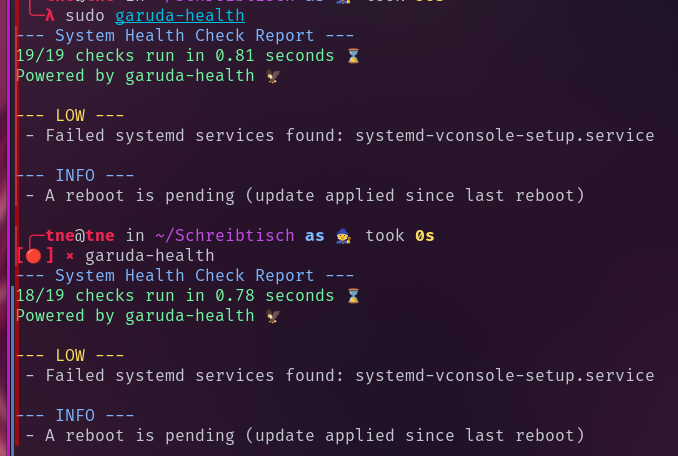I’m not entirely sure what this means. There is a check that makes sure that you have garuda-dracut-support installed even if you already have dracut installed. It’s a high priority message.
The founder of Garuda Linux itself is missing the base package, LOL
What I mean is, checking how certain necessary packages are installed (wether as dependencies or manually) is relevant to health checks, as having an explicit install could make an update go wrong if dependencies change, for instance.
as for nvidia-drivers, isn’t nvidia-closed “better” at least now? I know the OS driver will be better eventually though
A founder ![]()
Pushed garuda-health 1.0.1-1. Fixes rani-git detection and clarifies NVIDIA hardware profile message by making it more vague… As unintuitive as that is.
OH, sorry about that
I guess the open source driver IS the right choice now! thanks for the info!
Yeah, I am just a maintainer and artist, the hard work (developer) are doing by @tne and @dr460nf1r3, but each piece from the Garuda Team (which I love) is needed to make this great piece of software.
Apology:
That’s a very old Garuda version, where I miss something ![]()
System install date: 2021-08-05
One of my countless Garuda DE installations, all of which still run on old and new PC’s/notebooks.
Forgive me, I also ran garuda-health and it’s telling me I don’t have the driver installed, but when polling the system, I see I have nvidia-dkms installed. I have the RTX 3060 Ti - does this mean I should switch to nvidia-open-dkms ? Seems like I should based on the ArchWiki entry linked above, but when I initially installed Garuda, it installed the proprietary driver. I’m guessing this is a change?
Edit: so, I ran sudo garuda-hardware-tool --free and got this output:
> sudo garuda-hardware-tool --free
[sudo] password for shayaknyc:
Detecting hardware...
Detected GPU: Product: NVIDIA Corporation GA104 GeForce RTX 3060 Ti Lite Hash Rate, PCI ID: 01:00.0, Vendor ID: 10de
NVIDIA GPU detected, but --free specified. Skipping NVIDIA driver installation.
All required packages are already installed: garuda-hardware-profile-standard-x11
Am I missing something?
You are asking to install the free driver. The “open” driver is still proprietary.
Just do garuda-health --fix
Yes, this has changed.
I pushed version 1.1.0 of garuda-health with some more ![]() style
style![]() and some under the hood improvements for making things a little faster/more accurate.
and some under the hood improvements for making things a little faster/more accurate.
I still need more ideas for checks to add!
A check for the locale setting might be useful, with a user confirmation that it is set correctly.
A check on the local time might be useful as well, as connectivity may be lost if the time setting is very inaccurate.
Hmm, I’m not sure how to check that. What counts as incorrect?
Excellent idea.
That would depend on where the user typically resides, and the language they prefer to use. Only the user can can confirm what they actually desire to use on their system.
Then this is not something that can be automated. I was moreso thinking of the locale errors that show up. I don’t actually know what causes those so that could be neat to fix.
I will probably be fixing the time issue by checking if the systemd timedatectl is enabled.
No, and it is often difficult to fix sometimes for some users.
garuda-health --fix
--- System Health Check Report ---
17 checks run in 0.66 seconds ⌛
Powered by garuda-health 🦅
✅ System health check passed. No issues found.
Perfect ![]()
Oh, I see - I was very confused. Thank you!
Perhaps a smart status report of all drives. The code below is from Google, not my work.
Example for multiple drives:
To automate this for all detected /dev/sdX drives, you can use a loop:
Google’s code:
for drive in /dev/sd[a-z]; do echo "--- SMART status for $drive ---" sudo smartctl -a "$drive" echo ""done
This script will loop through all devices named /dev/sda through /dev/sdz and print their SMART status. Adjust the sd[a-z] pattern if you have other types of drives (e.g., NVMe drives like /dev/nvme0n1).
Perhaps also a test for free memory available, and a method to free up as much RAM as possible.
This is the command I use when my ram is taxed:
su -c "echo 3 >'/proc/sys/vm/drop_caches' && swapoff -a && swapon -a"
Implemented both of these checks. I did not implement the fix you suggested, however. Doing swapoff when memory is low is a bad idea, probably instant OOM.
The SMART check only works when garuda-health is run as root:
How ready do you all think this program is? Is it ready enough to be executed after every garuda-update?
- Yes
- Probably, but it probably needs more time.
- No (please reply with a reason or a suggestion)
